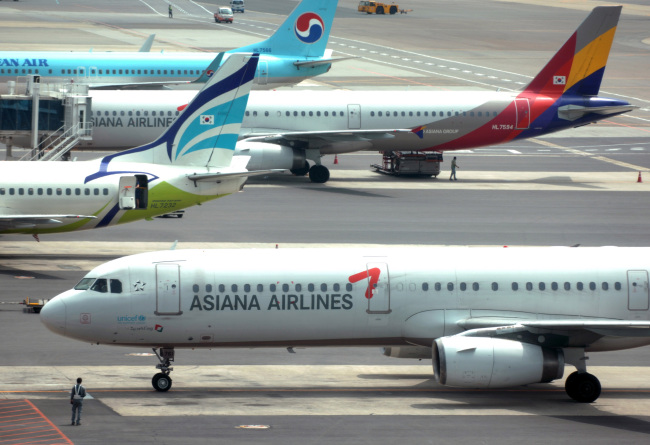The government appears to be leaning toward issuing heavy sanctions on Asiana Airlines next month as South Korea’s top carriers argued over the degree of sanctions for a fatal crash in San Francisco last year.
“The correct principle would be to order a flight suspension of Asiana’s Incheon-San Francisco route,” a Transport Ministry official told The Korea Herald Wednesday.
The official added that if the ministry reduces the penalty to a simple fine, it could “hamper public welfare.”
Under Korean aviation laws, Asiana can either be banned from operating its lucrative Incheon-San Francisco route for 45-135 days, or face fines of up to 2.25 billion won ($2.1 million).

Asiana Airlines passenger jets parked at Incheon International Airport. Bloomberg
The ministry also said a business suspension would not cause too much inconvenience for passengers as the nation’s largest carrier Korean Air could switch to the bigger Boeing 777, and since there were other foreign carriers to share the load.
Korean Air insists that the aviation authorities should impose “fair” and “consistent” penalties. This was mostly drawing from its own experience in the past when stern sanctions -- including a business suspension -- were issued.
Asiana, its smaller rival, on the other hand, is appealing to the Transport Ministry for a lighter sentence, saying that a business suspension would be too harsh and would cause inconvenience to its customers, not to mention, erode the reputation of local carriers.
The final decision regarding the sanctions is to be announced end-November after deliberations and hearings, based on the report of a seven-member administrative review committee.
The committee has been reviewing the San Francisco crash since June 25 when the U.S. National Transportation Safety Board announced its finding that pilot error caused the crash, since the Asiana crew overly relied on automated systems that they did not fully understand.
Suspending the Incheon-San Francisco route would serve Asiana a critical blow, as it is called the “golden route” boasting one of the highest seat occupancy rates of up to 85.8 percent for the carrier.
A 90-day suspension would cause Asiana to incur up to 30 billion won-40 billion won in losses.
Hoping to avoid such a penalty, Asiana has been enlisting the support of its fellow Star Alliance carriers, along with petitioning with the local Transport Ministry.
Last week, 43 airlines flying in and out of Incheon International Airport filed a joint petition asking the authorities not to suspend the Asiana flight.
Asiana’s labor unions also filed a petition saying that the sanctions were against national interests, as other foreign carriers would benefit from the suspension.
Back home, Korean Air has been publicly criticizing Asiana, saying that it was trying to avoid responsibility. It also filed a petition with the government, pressing it to take stern action for the sake of principle and passenger safety.
“If the government is inconsistent in carrying out administrative measures, it would be jeopardizing its own credibility,” Korean Air said in a press release last week.
In the late 1990s, Korean Air suffered severe sanctions after a series of accidents, including a crash in Guam that resulted in 228 fatalities.
The carrier faced a three-month business suspension and was denied aerial traffic rights for 18 months. During the same period, Asiana grew rapidly, obtaining 34 new routes.
Korean Air, therefore, may hope to reap similar benefits by expanding its flights on the San Francisco route under the Open Sky Agreement signed between Seoul and Washington, if Asiana is curtailed.
By Park Han-na (
hnpark@heraldcorp.com)






